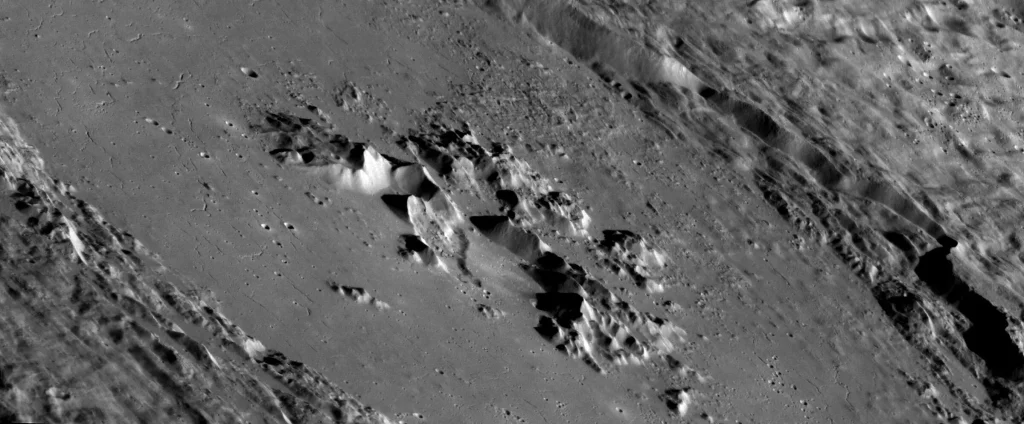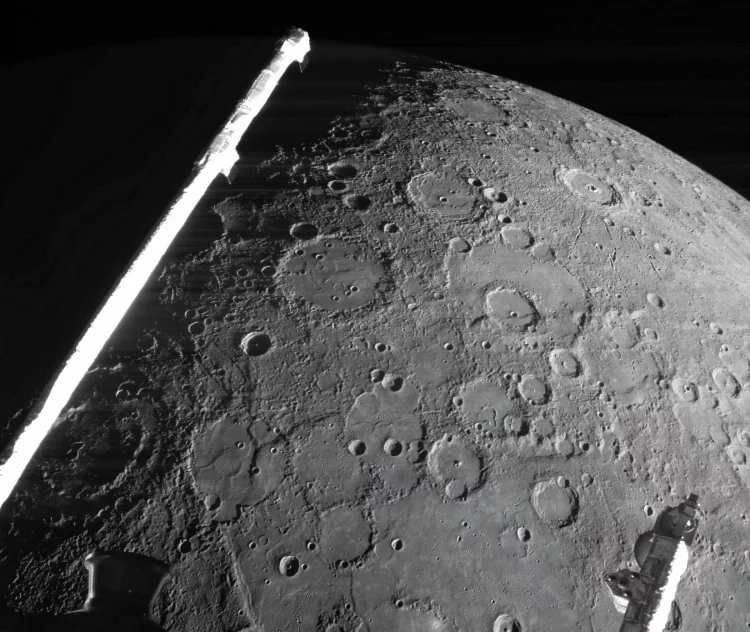Mercury, the closest planet to the Sun, is a world of extremes and contrasts, offering unique insights into the formation and evolution of our Solar System. Despite its proximity to the Sun, Mercury is a planet of remarkable complexity, characterized by its extreme temperatures, diverse surface features, and intriguing geological history. This article provides an in-depth exploration of Mercury, its physical characteristics, exploration missions, and scientific significance.
I. Overview of Mercury
1. Basic Facts
- Size and Mass: Mercury is the smallest planet in our Solar System, with a diameter of about 4,880 kilometers (3,032 miles) and a mass that is approximately 5.6% of Earth’s mass. Despite its small size, Mercury has a density similar to Earth’s, indicating a large iron core.
- Orbit and Rotation: Mercury orbits the Sun at an average distance of about 57.9 million kilometers (36 million miles), or 0.39 Astronomical Units (AU). Its orbit is highly elliptical, resulting in significant variations in distance from the Sun. Mercury has a slow rotation period, completing one rotation every 58.6 Earth days, and its orbital period is about 88 Earth days. This leads to a unique day-night cycle on Mercury.
- Atmosphere: Mercury has a very thin atmosphere, known as an exosphere, composed primarily of oxygen, sodium, hydrogen, helium, and potassium. This tenuous atmosphere is insufficient to support weather or climate as seen on Earth.
2. Physical Characteristics
- Surface: Mercury’s surface is characterized by a variety of geological features, including craters, basins, and plains. The surface is heavily cratered due to its lack of atmosphere to shield it from impacts, and it shows evidence of significant volcanic and tectonic activity.
- Temperature Extremes: The planet experiences extreme temperature variations due to its proximity to the Sun and its slow rotation. Daytime temperatures can reach up to 430 degrees Celsius (800 degrees Fahrenheit), while nighttime temperatures can plummet to -180 degrees Celsius (-290 degrees Fahrenheit).
- Magnetic Field: Mercury possesses a weak magnetic field, about 1% the strength of Earth’s. This magnetic field is believed to be generated by a partially liquid outer core, similar to Earth’s geodynamo but much weaker.
II. Geological Features and Surface Composition
1. Craters and Basins
- Caloris Basin: One of the largest and most well-known features on Mercury is the Caloris Basin, a colossal impact crater with a diameter of about 1,550 kilometers (960 miles). The impact that formed the basin created a series of concentric ridges and led to the formation of the “weird terrain” surrounding it.
- Ray Craters: Mercury’s surface is dotted with ray craters, which are craters surrounded by bright rays of ejecta material. These craters are often younger and indicate recent impacts.
- Scarps and Ridges: Mercury features extensive scarps and ridges, which are believed to be the result of the planet’s cooling and contracting over billions of years. These geological formations provide evidence of Mercury’s tectonic activity.
2. Volcanic and Tectonic Activity
- Volcanism: Mercury’s surface shows signs of ancient volcanic activity, including large plains formed by lava flows. These plains, known as “maria,” are similar to those found on the Moon but are less extensive.
- Tectonics: The planet’s surface is marked by a network of tectonic features, including faults and thrusts. These features suggest that Mercury has experienced significant internal stresses, likely due to its cooling and contraction over time.
3. Surface Composition
- Regolith: The surface of Mercury is covered by a layer of loose, fragmented material known as regolith. This regolith is composed of silicate minerals and metal fragments and is similar in composition to that found on the Moon.
- Surface Colors: Observations from space missions have revealed that Mercury’s surface exhibits a range of colors, from gray to reddish hues, due to the varying composition of its surface materials.
III. Exploration of Mercury
1. Early Observations
- Telescopic Observations: Early observations of Mercury were made using telescopes, revealing its phases and its position relative to the Sun. However, detailed study of Mercury’s surface and atmosphere required space missions.
2. Mariner 10 Mission
- Mission Overview: Launched in 1973, NASA’s Mariner 10 was the first spacecraft to visit Mercury. It conducted three flybys of the planet in 1974 and 1975, providing the first close-up images of Mercury’s surface.
- Scientific Discoveries: Mariner 10 discovered that Mercury has a magnetic field and provided detailed images of its surface, revealing its cratered landscape and identifying key features such as the Caloris Basin.
3. MESSENGER Mission
- Mission Overview: The MESSENGER (MErcury Surface, Space ENvironment, GEochemistry, and Ranging) mission, launched in 2004, was the first spacecraft to orbit Mercury. It arrived at Mercury in 2011 and conducted detailed studies until 2015.
- Scientific Contributions: MESSENGER’s observations provided extensive data on Mercury’s surface composition, geological history, and magnetic field. The spacecraft mapped the planet’s surface in high resolution and revealed the presence of water ice in permanently shadowed craters at the poles.
- Key Findings: MESSENGER’s data indicated that Mercury’s core is large and partially liquid, contributing to its weak magnetic field. The mission also confirmed the existence of volatile elements like sulfur on Mercury’s surface.

IV. Scientific Significance of Mercury
1. Understanding Planetary Formation
- Early Solar System: Studying Mercury provides insights into the early formation and evolution of the Solar System. As one of the oldest and most primitive planets, Mercury’s surface retains clues about the conditions and processes that shaped the early Solar System.
- Differentiation and Core Formation: Mercury’s large iron core and thin mantle offer valuable information about planetary differentiation and core formation. Comparing Mercury’s core to those of other planets helps scientists understand the processes that led to the formation of terrestrial planets.
2. Comparative Planetology
- Comparison with Other Planets: Mercury’s characteristics are compared with those of other terrestrial planets, such as Venus, Earth, and Mars. These comparisons help scientists understand the similarities and differences in planetary evolution and surface processes.
- Surface Processes: The study of Mercury’s surface features, such as its craters and scarps, provides insights into the geological processes that have shaped other rocky planets and moons in the Solar System.
3. Solar and Space Physics
- Solar Interaction: Mercury’s proximity to the Sun makes it an important subject for studying solar wind interactions and the effects of solar radiation on planetary atmospheres. Understanding Mercury’s response to solar activity helps scientists learn about the space environment and its impact on planetary bodies.
- Magnetosphere: Mercury’s weak magnetic field offers a unique opportunity to study planetary magnetospheres. Comparing Mercury’s magnetic field with those of Earth, Venus, and Mars provides insights into the role of magnetic fields in protecting planetary atmospheres and surfaces.
V. The Future of Mercury Exploration
1. Proposed Missions
- International Collaborations: Future missions to Mercury may involve international collaborations, combining resources and expertise from multiple space agencies. These missions could include orbiters, landers, and sample-return missions.
- Extended Observations: New missions may aim to extend observations of Mercury’s surface and atmosphere, providing more detailed data on its geology, magnetic field, and interactions with the Sun.
2. Technological Advancements
- Enhanced Instruments: Advancements in spacecraft technology and instrumentation will enable more detailed and comprehensive studies of Mercury. Improved imaging, spectrometry, and remote sensing capabilities will enhance our understanding of the planet.
- Long-Term Monitoring: Future missions may include long-term monitoring of Mercury’s surface and space environment. Continuous observation will provide valuable data on seasonal and temporal variations in solar activity and planetary processes.
3. Implications for Science and Exploration
- Understanding Planetary Evolution: Exploring Mercury will continue to contribute to our understanding of planetary evolution and the formation of the Solar System. Insights gained from Mercury will inform studies of other rocky planets and moons.
- Inspiration and Innovation: Mercury exploration inspires scientific curiosity and innovation, driving advancements in space technology and fostering international collaboration in planetary science.
VI. Conclusion
Mercury, the innermost planet of our Solar System, is a world of extremes and intrigue. From its extreme temperatures and varied surface features to its complex geological history and weak magnetic field, Mercury offers a unique perspective on planetary science. The exploration of Mercury has provided valuable insights into the formation and evolution of the Solar System and continues to inspire scientific discovery and technological innovation.
As we look to the future, ongoing and proposed missions will deepen our understanding of this enigmatic planet, revealing new details about its composition, history, and interactions with the Sun. Mercury remains a key focus for planetary scientists and space explorers, offering a glimpse into the early stages of planetary development and the dynamics of our cosmic neighborhood.











































Discussion about this post